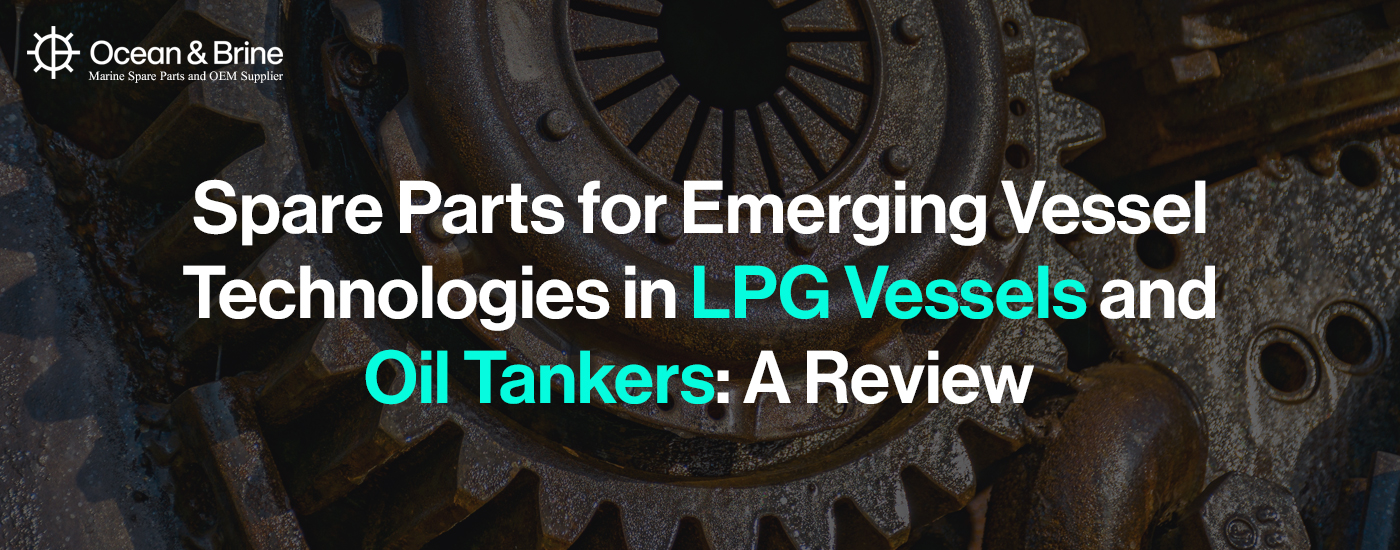Emerging vessel technologies have dramatically revolutionized the marine industry, particularly for Liquefied Petroleum Gas (LPG) vessels, and oil tankers. Advanced systems, such as automation, digitalization, and green technologies, mandate new types of spare parts to ensure operational reliability and compliance with international regulations.
This review explores the changing landscape of spare components needed for these advanced technologies, focusing on major trends, problems, and prospects.
LPG vessels and oil tankers play vital roles in the global supply chain, allowing energy resources to be transported over long distances. Technological developments, motivated by efficiency, safety, and environmental concerns, have resulted in systems requiring sophisticated spare components. These advances necessitate a re-assessing traditional spare parts supply chains and maintenance techniques.
Let us evaluate the emerging technologies in LPG vessels and oil tankers:
Automation and Control Systems
Modern vessels are equipped with advanced automation systems, including:
- Integrated Bridge Systems (IBS)
- Dynamic Positioning (DP) systems
- Autonomous navigation solutions
These technologies demand precise and reliable spare parts, such as sensors, actuators, and controllers, to maintain seamless operations.
Environmental and Energy Efficiency Technologies
The maritime sector faces mounting pressure to reduce emissions and improve fuel efficiency. Key technologies include:
- Ballast water treatment systems
- Scrubbers and Exhaust Gas Cleaning Systems (EGCS)
- LNG dual-fuel engines and hybrid propulsion systems
Spare parts for these systems include specialized filters, pumps, catalytic converters, and heat exchangers.
Digitalization and IoT Integration
Digital technologies enable real-time monitoring and predictive maintenance. Essential components include:
- IoT-enabled sensors
- Edge computing devices
- Cloud-based data platforms
These systems require high-quality electronics and robust communication devices to ensure reliability in maritime environments.
Spare parts for advanced cryogenic components for LPG vessels include:
Cryogenic pumps and compressors: These are used to transfer LPG from storage tanks to distribution systems or other tanks. They are designed to handle low temperatures without freezing and are equipped with advanced sealing systems to prevent leakage.
Insulated valves and fittings: Ball valves, globe valves, and check valves are designed specifically for cryogenic applications. These are made with low-temperature materials like Inconel or Monel. They have extended bonnets to keep the cryogenic fluid away from the actuator
LNG vaporizer spare parts: LNG vaporizers are useful for exchanging heat to degasifycryogenic liquefied gases that are deposited as a liquid under cryogenic temperatures. The spare parts for LNG vaporizers are emergency shut-off valves
Spare parts for automation and control system components typically consist of:
PLC Modules and Controllers: Programmable Logic Controllers (PLCs) are necessary for the automation and control systems in LPG vessels. The Spare Parts include CPU models, I/O models, communication modules, power supply modules, and memory cards and batteries.
Remote Monitoring Systems: Remote monitoring systems enable real-time data collection, diagnostics, and system control from a central location. These systems contain the following spare parts – Human-machine interface (HMI) panels, Industrial PCs and embedded controllers, network switches and routers, sensors and transmitters, and signal converters and data loggers.
Servo Motors and Actuators: Servo systems provide precise motion control for cryogenic valves, loading arms, and automated handling systems. The spare parts include servo motors, encoders, motor drivers and controllers, linear and rotary actuators, and gearboxes and couplings.
Spare parts for emergency and safety equipment spare parts are:
Lifeboat and firefighting system spares: Lifeboat and firefighting systems are the most essential components of a vessel and are crucial to saving lives in case of an emergency on a vessel. Their spare parts consist of a lifeboat davit, lifeboat crane, boat hook, fire extinguishers, emergency lights, first-aid kits, food and water, and survival gear.
Inert gas generator components: Inert gas generator contains a combined burner and scrubber, and both are seawater-cooled. The spare parts include the scrubber unit, inert gas blower fans, oxygen analysersensors, the deck water seal, the pressure/vacuum breaker, valves, instrumentation, and the control system.
Now we know what are the emerging vessel technologies in LPG vessels and oil tankers. However, there are a few challenges in procuring these spare parts in time that can be overcome with organized management. Some of the challenges in spare parts management include
- Supply chain issues like long lead times for specific components, dependency on a set of suppliers, and geopolitical disturbances that disrupt logistics
- Fast-growing technologies increase the risk of spare parts becoming obsolete and thereby regular update to inventory systems and close collaboration with OEMs is required
- Regulatory compliances are strict and are compulsory while buying spare parts. This poses an additional complexity to procurement processes
The future of emerging vessel technologies in LPG vessels and oil tankers can be a more planned and organized activity that can be ensured by
- Standardized spare parts and systems through all manufacturers to simplify inventory management and decrease costs
- Advanced analytics and machine learning can predict problems accurately, optimizing spare parts procurement and usage
- 3D printing offers a promising solution for on-demand production of spare parts, potentially reducing lead times and costs
Emerging technologies in LPG vessels and oil tankers are changing the demand for spare components. Stakeholders must adapt by embracing advances in supply chain management, predictive maintenance, and environmentally friendly practices. Collaboration among manufacturers, operators, and regulators are critical to ensuring that spare parts keep up with technological advances and regulatory requirements.
Contact us for all your marine spare parts needs or to explore partnership with us!
